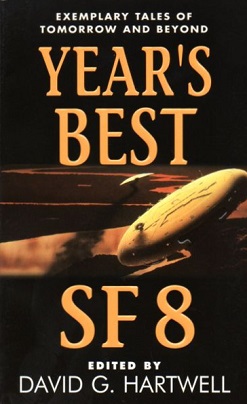
Michael Swanwick is an American fantasy and science fiction author who began publishing in the early 1980s.
Victor Gollancz Ltd was a major British book publishing house of the twentieth century and continues to publish science fiction and fantasy titles as an imprint of Orion Publishing Group.
SciFaiku is a form of science fiction poetry first announced by Tom Brinck with his treatise on the subject, The SciFaiku Manifesto. Brinck has been referred to as the "Father of SciFaiku." SciFaiku is inspired by Japanese haiku, but explores science, science fiction (SF), and other speculative fiction themes, such as fantasy and horror. They are based on the principles and form of haiku but can deviate from its structure.

John Michael Scalzi II is an American science fiction author and former president of the Science Fiction and Fantasy Writers of America. He is best known for his Old Man's War series, three novels of which have been nominated for the Hugo Award, and for his blog Whatever, where he has written on a number of topics since 1998. He won the Hugo Award for Best Fan Writer in 2008 based predominantly on that blog, which he has also used for several charity drives. His novel Redshirts won the 2013 Hugo Award for Best Novel. He has written non-fiction books and columns on diverse topics such as finance, video games, films, astronomy, writing and politics, and served as a creative consultant for the TV series Stargate Universe.

Eileen Gunn is an American science fiction author and editor based in Seattle, Washington, who began publishing in 1978. Her story "Coming to Terms", inspired, in part, by a friendship with Avram Davidson, won the Nebula Award for Best Short Story in 2004. Two other stories were nominated for the Hugo Award: "Stable Strategies for Middle Management" and "Computer Friendly" (1990).

Martha Wells is an American writer of speculative fiction. She has published a number of fantasy novels, young adult novels, media tie-ins, short stories, and nonfiction essays on fantasy and science fiction subjects. Her novels have been translated into twelve languages. Wells has won four Hugo Awards, two Nebula Awards and three Locus Awards for her science fiction series The Murderbot Diaries. She is also known for her fantasy series Ile-Rien and The Books of the Raksura. Wells is praised for the complex, realistically detailed societies she creates; this is often credited to her academic background in anthropology.
John Gregory Betancourt is an American writer of science fiction, fantasy and mystery novels, as well as short stories. He is also known as the founder and publisher, with his wife Kim Betancourt, of Wildside Press in 1989. In 1998, they entered the print on demand (PoD) market and greatly expanded their production. In addition to publishing new novels and short stories, they have undertaken projects to publish new editions of collections of stories that appeared in historic magazines.

Jim Butcher is an American author. He has written the contemporary fantasy The Dresden Files, Codex Alera, and Cinder Spires book series.

The Periodic Table is a 1975 short story collection by Primo Levi, named after the periodic table in chemistry. In 2006, the Royal Institution of Great Britain named it the best science book ever.

Puck Aleshire’s Abecedary (2000) by Michael Swanwick, a collection of short-short stories, initially ran in The New York Review of Science Fiction at a rate of one per month for 26 months starting with Issue 111, November 1997. Each story was accompanied by a collage illustration by the journal's editor Kathryn Cramer. Dragon Press collected these stories in a single volume entitled Puck Aleshire’s Abecedary.

Overclocked: Stories of the Future Present is a collection of previously published science fiction short stories and novellas by Canadian writer Cory Doctorow. This is Doctorow's second published collection, following A Place So Foreign and Eight More. Each story includes an introduction by the author.

Year's Best SF 8 is a science fiction anthology edited by David G. Hartwell and Kathryn Cramer that was published in 2003. It is the eighth in the Year's Best SF series.

Lou Anders is the author of the Thrones & Bones series of middle grade fantasy novels. Anders is a Hugo Award-winning American editor, a Chesley Award-winning art director, an author and a journalist.
Pulphouse Publishing was an American small press publisher based in Eugene, Oregon, and specializing in science fiction and fantasy. It was founded by Dean Wesley Smith and Kristine Kathryn Rusch in 1988. The press was active until 1996. Over that period, Pulphouse published 244 different titles.

The EC Archives are an ongoing series of American hardcover collections of full-color comic book reprints of EC Comics, published by Russ Cochran and Gemstone Publishing from 2006 to 2008, and then continued by Cochran and Grant Geissman's GC imprint (2011–2012), and finally taken over by Dark Horse in 2013.

Once More* With Footnotes is a book by Terry Pratchett, published by NESFA Press in 2004 when he was the Guest of Honor for Noreascon Four, the 62nd World Science Fiction Convention. It contains a mixture of short stories, articles, introductions to other books, and speeches, including his first published short story, "The Hades Business".

Distrust That Particular Flavor is a collection of non-fiction essays by American author William Gibson, better known for his speculative and science fiction novels.

Max Gladstone is an American fantasy author. He is best known for his 2012 debut novel Three Parts Dead, which is part of The Craft Sequence, his urban fantasy serial Bookburners, and for co-writing This Is How You Lose the Time War.

David J. Howe is a British writer, journalist, publisher, and media historian.
Abyss & Apex Magazine (A&A) is a long-running, semi-pro online speculative fiction magazine. The title of the zine comes from a quote by Friedrich Nietzsche (1844-1900), "And if you gaze long into the abyss, the abyss gazes also into you." The stories and poetry therefore follow the pattern of "how would humans react?" if a new technology or a type of magic or supernatural power affected them.















